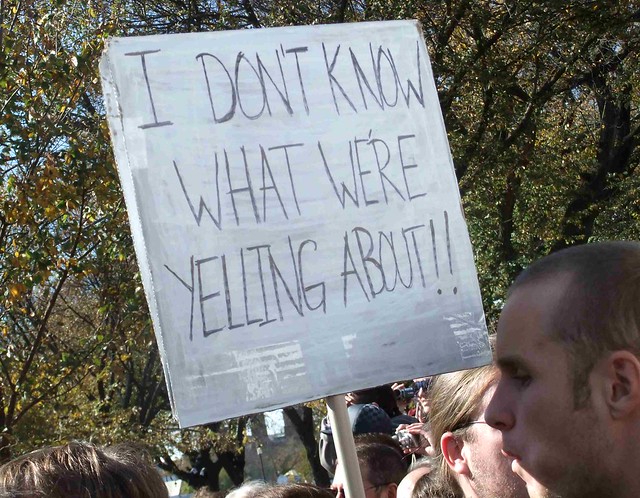I'm going to assume that almost everyone reading this knows what a comment box is. There's one below every post here. Bastions of free speech: moderated comments allow anyone who cares even a vague amount to express their opinion to everybody who passes by. In the least calm and rational manner possible, in some cases.
The crux of every social media site includes comments, along with media sharing. Even sites dedicated to user-generated (rather than shared) content communities, like Deviantart, Fictonpress, Ravelry, and Etsy include comments as a focal part of their platform: allowing anyone to create written, art, or craft work and then receive feedback on it from a general audience.
As mentioned yesterday, audience feedback is a dialogue that has taken on a new form and sense of power from the presence of the internet. Fan approval or outrage can sway the sales and distribution of media, and either laud or revile the personalities that talk about it.
I'm talking about critics. The push-button-to-hate culture doesn't make it easy for them to handle what essentially is considered the general public's beloved baby.
The fifth installment of the popular video game franchise Grand Theft Auto was recently released, after about five years of development. Fans were elated to get right back into the popular wide-open no-consequences sandbox game and start stealing cars and running over grandmas.
Then Gamespot, popular gaming community hub, rated the game a lowly 9/10.
The resulting backlash of not getting a perfect score was so great, Gamespot made a response video calling out the chaos.
The theme of an insecure male-dominant fanbase (despite over 40 percent of gamers identifying as women) being uncomfortable with women being an authority on the games they are possessive of is pervasive and certainly nothing new. Raging fans created a petition to try and get Petit fired from Gamespot (since removed). Anita Sarkeesian, feminist media critic and host of Feminist Frequency received death threats for daring to make a video series commenting on sexism in video games, and one maladjusted individual even created a whole flash game about battering her.
Trying to fire Petit, and trying to silence Sarkeesian, are two unorganized, organic efforts to try and subdue a discourse that some consumers find threatening to their worldview. The studios that make these games, have nothing to do with this dialogue; consumers are yelling at other consumers, through the easy-reward-low-investment-low-accountability interface of a comment box.
Youtube is trying to clean up the veritable hive of scum and villainy that rests below every flash player on their site. Their approach involves algorithms that sort comments, burying the least valuable ones to humanity below ones that at least don't wear underwear on their heads. Theoretically, this is supposed to limit visibility of frustrating comments, so nobody reacts to them and their presence is not rewarded, discouraging their presence. Whether this is censorship is debatable. By trying to encourage people to link their google pages accounts to YouTube, Google has tried to reduce the shield of anonymity on offensive comment trolls, but with limited success.
The determination and free time of angry internet trolls are limitless, however, and one can only imagine how long it will take for someone to invent a web gadget that restores the comments to how they were before. Whether this is in defense of free and unrestricted speech, or over-entitlement to the right to call people fags behind an anonymous mask, only time and downvotes will tell.
It sort of looks like this. (Photo: Flickr user sokup)
As mentioned yesterday, audience feedback is a dialogue that has taken on a new form and sense of power from the presence of the internet. Fan approval or outrage can sway the sales and distribution of media, and either laud or revile the personalities that talk about it.
I'm talking about critics. The push-button-to-hate culture doesn't make it easy for them to handle what essentially is considered the general public's beloved baby.
Why did you downvote my baby?! (Gif: Spirited Away)
The fifth installment of the popular video game franchise Grand Theft Auto was recently released, after about five years of development. Fans were elated to get right back into the popular wide-open no-consequences sandbox game and start stealing cars and running over grandmas.
Then Gamespot, popular gaming community hub, rated the game a lowly 9/10.
The resulting backlash of not getting a perfect score was so great, Gamespot made a response video calling out the chaos.
Pictured: Gamespot's audience gets told.
As the host of Feedbackula eloquently states,
"There were so many comments this week saying that political discourse doesn't belong in game reviews, or that it's 'just a game' and 'we should just shut up and deal with it.' Really though, honestly, what kind of attitude is that? How does that make the gaming community look? If we ever want to see games being broadly accepted as an art form, or as anything but a slightly quirky pass-time, we have to include politics. we have to ask questions about gender, about the portrayal of characters, and about the limits of satire. Because satire isn't satire if it doesn't challenge the thing it copies; that is repetition."As most readers can probably infer, the non-perfect score was awarded due to the limited roles of women portrayed in the game: as unsatisfied wives, hookers, straw-feminists made to mock actual strives towards gender equality, and other less-than-empowering roles. The messenger of this dissatisfaction was Carolyn Petit, a game journalist who also is a trans woman. This went over as well as one could expect in a largely unprogressive, male-dominated gamer culture.
Not well. (Creative Commons)
The theme of an insecure male-dominant fanbase (despite over 40 percent of gamers identifying as women) being uncomfortable with women being an authority on the games they are possessive of is pervasive and certainly nothing new. Raging fans created a petition to try and get Petit fired from Gamespot (since removed). Anita Sarkeesian, feminist media critic and host of Feminist Frequency received death threats for daring to make a video series commenting on sexism in video games, and one maladjusted individual even created a whole flash game about battering her.
Trying to fire Petit, and trying to silence Sarkeesian, are two unorganized, organic efforts to try and subdue a discourse that some consumers find threatening to their worldview. The studios that make these games, have nothing to do with this dialogue; consumers are yelling at other consumers, through the easy-reward-low-investment-low-accountability interface of a comment box.
Youtube is trying to clean up the veritable hive of scum and villainy that rests below every flash player on their site. Their approach involves algorithms that sort comments, burying the least valuable ones to humanity below ones that at least don't wear underwear on their heads. Theoretically, this is supposed to limit visibility of frustrating comments, so nobody reacts to them and their presence is not rewarded, discouraging their presence. Whether this is censorship is debatable. By trying to encourage people to link their google pages accounts to YouTube, Google has tried to reduce the shield of anonymity on offensive comment trolls, but with limited success.
The determination and free time of angry internet trolls are limitless, however, and one can only imagine how long it will take for someone to invent a web gadget that restores the comments to how they were before. Whether this is in defense of free and unrestricted speech, or over-entitlement to the right to call people fags behind an anonymous mask, only time and downvotes will tell.



{ 0 comments... read them below or add one }
Post a Comment